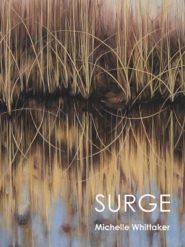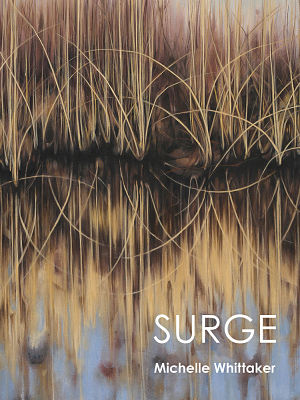Writers Read: Surge by Michelle Whittaker
 In Michelle Whittaker’s debut collection, Surge, we begin in the after. After what is not as important as the life lived after trauma—an afterlife. Though we arrive having already crossed this border safe and sound, an epigraph from Susan Sontag reminds us that we’re still dual citizens: passport carriers from “the kingdom of the well” and “the kingdom of the sick.” Though we prefer to show the first credentials to the world around us, the second is still a part of who we are. A double identity that will have to be acknowledged and reconciled.
In Michelle Whittaker’s debut collection, Surge, we begin in the after. After what is not as important as the life lived after trauma—an afterlife. Though we arrive having already crossed this border safe and sound, an epigraph from Susan Sontag reminds us that we’re still dual citizens: passport carriers from “the kingdom of the well” and “the kingdom of the sick.” Though we prefer to show the first credentials to the world around us, the second is still a part of who we are. A double identity that will have to be acknowledged and reconciled.
Soon after we leave Sontag, the poems begin to cast spells of illusion, disappearance, and deflection. “In the Afterlife,” we’re told:
but we don’t really need to talk about that fact
and we don’t really need to talk about the thunder
thundering inside the house
where he died
And oh what lovely spells the poet casts to convince us that we’re no longer in the kingdom of the sick, “citizens of that other place,” as Sontag says. Whittaker is a poet with an ear for music, which is apparent in the sound and rhythm of language. Just listen as the body sings a madrigal:
The last “o” in morto
sacred in whole beats
almost strongholds
a sonogram seated
below the copious ribs
Sing as the body might against the violent memory of “the masked intruder / who knifed this home,” there is no holding back the surging storm on the horizon. It finally arrives in a “WARNING REPORT” and a tornado, which Dorothy-and-Toto-style lands us first in the emergency room and then in the second section of the book.
The surge of stormy light splits the narrator’s “we” into a highly differentiated “I” and “you.” The “I” begins the work of individuation through the negative: “I’m not Your work.” This refrain, which recurs throughout the section’s “Interludes,” begins building a new sense of self by stripping away the old. Gregory Orr writes in Poetry as Survival: “What certain poets of trauma intuit is that their old self cannot survive the suffering it has experienced without succumbing [to death]. Thus necessity permits and compels imagination to create a new self, a self strong enough or different enough to move through and beyond the trauma and its aftermath.” Negation becomes the framework for this imaginative act of re-creation—one that leaves the “I” with a dizzying multitude of possible “I am’s.”
The creation of this new “I” begins with staring into “A Mirror of a Mirror,” trying to sift through memories that bend and create blind spots even as we look. Tricks of the eye and sleights of the hands threaten to overwhelm the narrator, who tells us a few poems later in “Letting Go Seeds”:
I know
it would be
better to
let it go
and let it be
but these hands
want to
let the whole
damn thing
gong
When we arrive at the poem of “Identification,” the speaker must find a way to claim passports to both the land of the after and the land of before. Here the “I” is finally able “to give up.” In a stunning musical image, the poet writes that the refusal to forget what was is “like a four-handed duet folded / into an embalming fluid.” These immortal hands, silent and still, will not make music again. A new song from new hands finally emerges at the end of the poem, giving up their last thought before “…driving in / after the last of Schubert’s thirds.” This song ushers us into the third section of the book and wields the deeper magic that the earlier spells lacked. We arrive with the narrator at a second childhood, in the after. Yet the arrival “In the Afterlight” has left our narrator with a litany of questions:
What is the speed of forcible suspension?
Or the permanency of no return?
What is the speed of saying no? And the meaning no more?
Is it like the speed of being chased down?
Or the speed of light? Or the sly
Of a streaming bullet?
Is it like the speed of ripping through cells?
I wish I understood the physics…

Michelle Whittaker
The poem is dedicated in part to Jordan Davis, a relative of the poet whose own life was ended at 17 by “a streaming bullet.” The physics of the violent country the poems have entered is indeed foreign. A vulture, a child, and a cameraman hover suspended in time and space. A woman laying in a hospital bed falls asleep and transforms into “a dead world.” An invisible woman becomes visible only when hung from a tree. Through this strange new universe, lined with more mirrors and humming with prayers, the “I” continues to try to call into being this new child of the afterlight. In “Process,” we leave a self who is still working toward that light. Yet, the series of “I am” statements and yeses that close the book read like a benediction:
As I console the yes, here I am still
Somewhere in the quilted damage
Hushed in a mountain
Dumpster green
Where I will be resting
And Yes
I’ll be resting with you.
Whittaker’s Surge leaves us there, at the foot of that newly visible mountain, saying yes and amen.


 Erica Charis-Molling is a creative writing instructor for Berklee Online and a librarian at the Boston Public Library. Her writing has been published in Glass, Dark Matter, Anchor, Vinyl, Entropy, Mezzo Cammin, and Apricity. She was the assistant editor at About Place and the Eco-Justice Anthology Support Intern at Split This Rock. She’s an alum of the Bread Loaf Writers’ Conference and is currently pursuing her MFA in creative writing at Antioch University.
Erica Charis-Molling is a creative writing instructor for Berklee Online and a librarian at the Boston Public Library. Her writing has been published in Glass, Dark Matter, Anchor, Vinyl, Entropy, Mezzo Cammin, and Apricity. She was the assistant editor at About Place and the Eco-Justice Anthology Support Intern at Split This Rock. She’s an alum of the Bread Loaf Writers’ Conference and is currently pursuing her MFA in creative writing at Antioch University.


